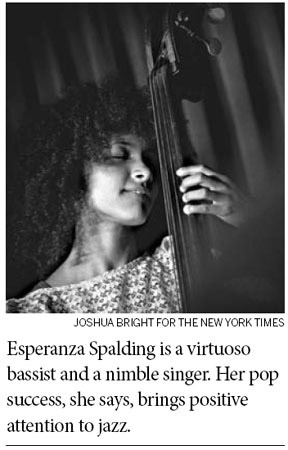


Before flying to Los Angeles for her Grammy week duties last month, Esperanza Spalding practically batted away a question about the impact of the best new artist award on her life and career.
"More attention," was her unusually succinct reply, though she explained. "Before the Grammy last year I used to say it's like being a worker ant, going back and forth to get the food, and all of a sudden someone's watching you and following you along." She held up an imaginary magnifying glass. "But now I see that the spotlight can actually directly serve the music."
That conviction courses through "Radio Music Society," her fourth album, a collection of groove-based songs, almost all originals, that is Ms. Spalding's version of a crossover pop album. At the same time its credits include dozens of her fellow jazz musicians. Bringing them on board meant a lot to Ms. Spalding, who has clung to her worker-ant affinities even as public perception, and her own fresh-faced ambitions, conspired to anoint her queen of the colony. Her utopian urge to share the spotlight sits a bit uneasily against the very singular nature of her stardom.
Ms. Spalding, 27, grew up in Portland, Oregon, and now splits her time between New York and Austin, Texas. She has made her mark not just as a virtuoso jazz bassist or an effortlessly nimble singer but as an exotic hybrid of the two.
"From the first tune we played together, she had a beautiful, flowing feel, and brought a real melodic approach to the bass part," said the saxophonist Joe Lovano, who taught Ms. Spalding in a combo class at the Berklee College of Music in Boston, and took her on tour. Mr. Lovano later formed Us Five, with Ms. Spalding strictly on bass, alongside a pianist and two drummers; the band had a nominated album at this year's Grammys.
The drummer Terri Lyne Carrington, who also first encountered Ms. Spalding at Berklee, included her as part of an all-female cast on "The Mosaic Project," which won the Grammy for best jazz vocal album last month. (Ms. Spalding was one of its feature singers.) They also recently unveiled a trio with the estimable post-bop pianist Geri Allen.
The power of the ensemble is palpable for Ms. Spalding. When the jazz magazine DownBeat decided to run a cover article on "Radio Music Society," she suggested that the photo shoot also include Mr. Lovano, Ms. Carrington and the drummer Jack DeJohnette, who all appear on the album.
"One thing that irks me a little bit is this idea that people paying attention to you is good for everybody," she said. "But it's such a focused beam of light that that's not realistic. Unless you intentionally go, like, 'I'm with him!'" She crooked one arm as if to pull in the person next to her. "So the idea of this society is: yeah, we are making this music. And it really takes a 'we' to make this kind of music."
The album mingles love songs with social commentary. Its lead single, "Black Gold," is aimed at African-American boys, calling up a cultural legacy that predates slavery. The Wayne Shorter fusion anthem "Endangered Species" comes with new lyrics framing an environmental parable.
The songs raise questions but don't exactly point fingers. "I don't think I'm taking a stand. I'm inviting a listener into a dialogue." The difference seemed as clear to her as the difference between a lead vocal and the interplay of a band.